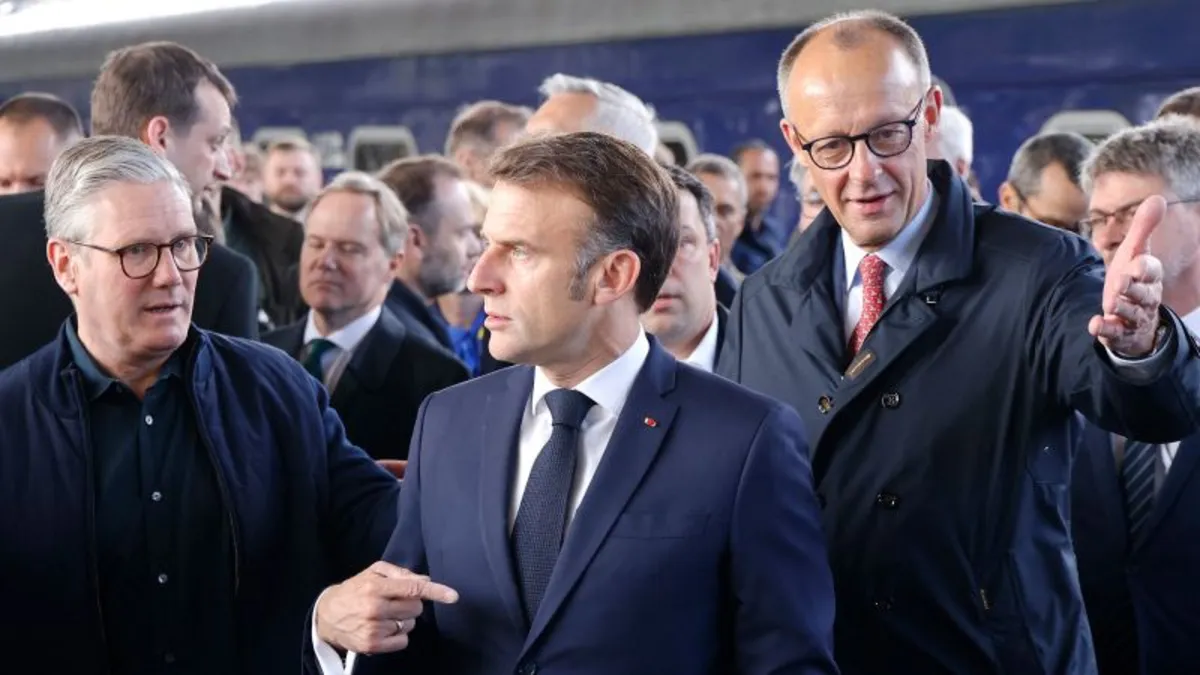
In a significant display of solidarity, the leaders of Germany, France, the United Kingdom, and Poland have arrived in Kyiv for crucial discussions with Ukraine’s President Volodymyr Zelensky. This meeting underscores a united European stance aimed at applying pressure on Russian President Vladimir Putin. The delegation, which includes new German Chancellor Friedrich Merz, French President Emmanuel Macron, UK Prime Minister Keir Starmer, and Polish Prime Minister Donald Tusk, touched down together on Saturday morning at Kyiv’s main railway station, where they were welcomed by Zelensky’s chief of staff, Andriy Yermak.
The purpose of this high-level meeting is to convey a renewed diplomatic urgency aimed at achieving a ceasefire in the ongoing war between Russia and Ukraine. Despite ongoing efforts by the United States to broker peace, the conflict continues to escalate. In a message shared on his Telegram channel, Yermak emphasized the pressing need for dialogue, stating, “There is much work to be done and many issues to discuss. This war must be ended with a just peace. Moscow must be forced to agree to a ceasefire.”
One of the first stops for the European leaders was Kyiv’s Independence Square, where they paid their respects to fallen Ukrainian soldiers. Ukraine, backed by European allies, has been advocating for an immediate and unconditional 30-day ceasefire, a sentiment echoed by former US President Donald Trump. However, Russia has been hesitant to commit, acknowledging the idea of a ceasefire but insisting on addressing certain “nuances” first, as stated by Kremlin spokesman Dmitry Peskov in an interview with ABC News.
Peskov indicated that one of these “nuances” involves halting the supply of US and European weapons to Ukraine. President Putin has frequently referred to the need to address what he terms the “root causes” of the conflict, which include issues surrounding the eastward expansion of NATO. In a recent post on Truth Social, Trump expressed his frustration with Russia’s stalling tactics, warning that failure to respect the ceasefire could lead to further sanctions imposed by the US and its allies.
The upcoming inauguration of Trump in January is expected to significantly alter the US’s diplomatic focus regarding the war, raising concerns among Ukraine and its key allies about a potential shift in US policy favoring Moscow. In response, European leaders have convened a series of meetings to demonstrate that Europe is committed to supporting Ukraine militarily while also presenting a unified front urging the US President against aligning with Russia.
In a tweet on Saturday morning, French President Macron declared, “A just and lasting peace begins with a full and unconditional ceasefire. That is the proposal we are advancing with the United States.” He highlighted that Ukraine had accepted the ceasefire proposal on March 11, but lamented Russia's ongoing delays and preconditions, which he claimed are merely tactics to prolong the conflict. “If Moscow continues to obstruct, we will step up the pressure—together, as Europeans and in close coordination with the United States,” he added, welcoming Trump’s call to push forward in this direction.